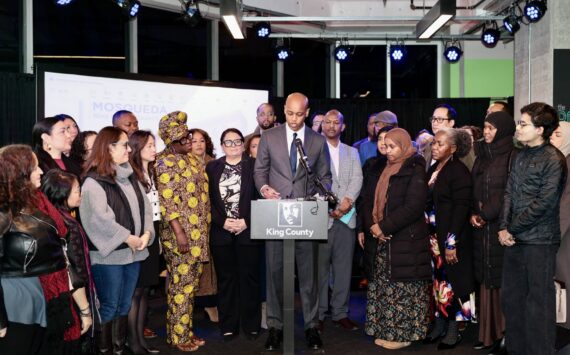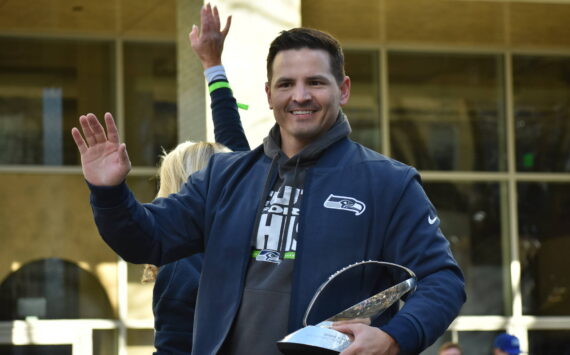Last year’s City Council election was, in the parlance of the Republican presidential front-runner, yuge.
Amazon isn’t only concerned with Seattle policy makers. In this March 3 photo, Secretary of Defense Ash Carter is given a tour of Amazon headquarters in Seattle. DoD photo by Navy Petty Officer 1st Class Tim D. Godbee/Flickr
Forty-seven candidates. Brand-new districts. $3.8 million in direct campaign contributions. And another $784,365 in money from political action committees (PACs)—a 17-fold increase over the average in prior elections.
A report released last week by the Seattle Ethics and Elections Commission gives us the clearest idea yet of who spent what on whom—a weather-satellite look, if you will, at the hurricane of money that swept Seattle last year. It turns out that PACs, overwhelmingly representing business interests, made it rain on three particular candidates: Rob Johnson, Tim Burgess, and Shannon Braddock. Everyone else got sprinkles at best.
In other words, PACs, which the Supreme Court ruled in 2010 can spend unlimited sums to influence an election as long as they don’t coordinate with campaigns, didn’t spend more because there were more candidates to back. Instead, the money went to a few high-stakes races in districts 1, 4, and 8.
And the stakes were high. All nine City Council seats were up for election, and with three incumbents declining to seek re-election, at least three Council seats were guaranteed to host fresh bottoms. The races’ outcomes would alter the entire balance of the Council and, by extension, the trajectory of Seattle politics for years to come. So would this Council support a good development and business climate, or fall to grumpy neighbors and upstart leftists?
The Civic Alliance for a Sound Economy, the Seattle Chamber of Commerce’s PAC, was the biggest pusher of independent expenditures last year, and was largely funded by the engines of Seattle’s explosive growth. It collected a total of nearly half a million dollars, with major contributions from Vulcan, Amazon, the development company R.C. Hedreen, and the Rental Housing Association. A close look at Civic Alliance’s spending suggests a shrewd deployment of big cash to ensure its candidates won their races.
For example, in District 4, pro-development urbanist Rob Johnson and social-justice progressive Michael Maddux both competed against incumbent Jean Godden. In this early race, Johnson seemed vulnerable—and lo, money flowed into the “People for Rob” PAC—$81,500, more than half of it from the Civic Alliance. Johnson went on to win the primary by eight points. Godden was the surprise loser in the primary, giving Johnson an easy road to victory in the general election; he received no more money from any PACs.
In the Position 8 primary race, moderate incumbent Tim Burgess looked invulnerable to challenges by tenants advocate Jon Grant and musician John Roderick. No PAC money was spent on Burgess’ account until, in the weeks leading up to the general election, it looked as if Grant might actually have a chance at riding the anti-developer bandwagon to victory. Shortly before the election, $219,300 poured into the “United for Tim” PAC, most of it coming directly from the Civic Alliance. Burgess won in an expensive landslide.
Former County Council aide Shannon Braddock was the only candidate to receive heavy PAC spending in both the primary and the general. Thanks in part to generous PACs, Braddock weathered the crowded District 1 primary, coming out two points behind lefty Lisa Herbold. In the general election, the Civic Alliance and a handful of other PACs poured out $130,500 on Braddock’s behalf. However, she lost the election by a mere 37 votes.
“I think they basically were afraid that Lisa Herbold would be Licata on steroids,” says Herbold’s old boss, retired Councilmember Nick Licata. The pair worked together at City Hall for nearly two decades, and their similarities include a leftish take on economics, skepticism toward market results, and sympathy with neighborhood activists. Not exactly a business candidate.
By contrast, Braddock “was seen as … at a minimum approachable and in the best-case scenario someone who would probably go along with most of what they wanted—someone more sympathetic,” says Licata. “I’m not implying that she would be a pawn or anything, but these things often come down to a critical vote.”
We requested an interview with the Civic Alliance for this story. Executive director Markham McIntyre replied in a statement that it’s against policy to discuss campaign strategy, but said “I can assure you that all of the candidates we endorsed demonstrated a strong commitment to improving the quality of life and economic opportunities for all Seattleites.”
We also reached out to several of the Civic Alliance’s major funders: Amazon, the Rental Housing Association, Vulcan, and the Washington Realtors Association. Only developer R.C. Hedreen called us back.
“Our rationale was pretty simple,” says president David Thyer. “We were supportive, mainly through the Seattle Chamber of Commerce, of their slate of candidates and the pro-business agenda of those candidates.”
“We’re a developer,” he continues, “so we’ve been working on a large hotel project and we’ve had a lot of interaction with the city permitting authorities … A good outcome for us is getting through the process and being able to develop the projects we want to develop.” That’s not to imply there’s any quid pro quo, he adds. “It’s not about us forcing any Councilmember or any city entity to do anything.”
Asked whether he thought this kind of PAC spending was corrupting politics, Thyer replied that he agrees with Bernie Sanders. “I think there is too much money in politics,” he says, “but to the extent that one has to compete because of that phenomenon, then we have to compete along with everybody else.”
In other words, hate the game, not the player?
“Pretty much.”
Casey Jaywork covers City Hall and policy for Seattle Weekly. He can be reached at cjaywork@seattleweekly.com or 206-467-4332. Follow him on Twitter. Get more from your favorite writers by subscribing to our weekly newsletters.








